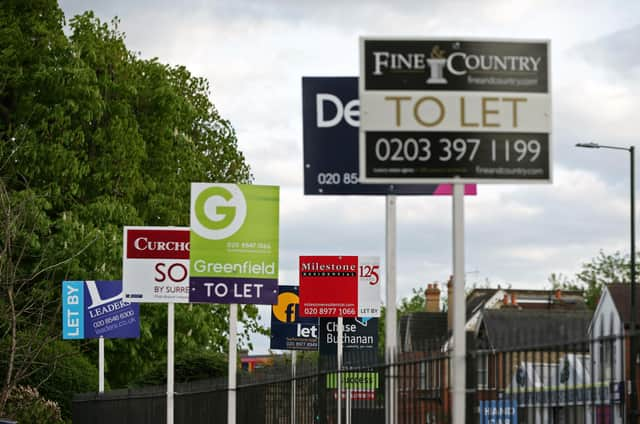Cost of living crisis: New the City of London tenants face income squeeze as rent costs rise


The average tenant in the City of London faces a squeeze on their income following an increase in rent costs in the year to March – before the cost of living crisis escalated.
The Government recently unveiled its renters' reform bill, which aims to ban no-fault evictions, provide greater legal power for renters to challenge landlords on unfit homes and protect them against unjust price rises.
Advertisement
Hide AdAdvertisement
Hide AdShelter said the bill is "a gamechanger for England’s 11 million private renters" but also expressed concern for tenants living on a knife-edge as the cost of living soars.
The median monthly rent for a property in the City of London stood at £1,755 per month in the 12 months to March, Office for National Statistics figures highlight – up from £1,648 the year before but down from £2,102 in 2020, before the coronavirus pandemic.
The median is a measure used to exclude extreme values which could skew the average.
One-bedroom properties in the City of London cost an average of £1,712 in the year to March, compared to £1700 in 2020-21, while the median cost of an average two-bedroom property rose from £2210 to £2297.
Advertisement
Hide AdAdvertisement
Hide AdIn England, a rental property cost £795 per month, up from £730 the previous year and £700 in 2020.
Polly Neate, chief executive of Shelter, said millions of tenants are "living on a knife-edge with no wriggle room to help then navigate rising costs" as private rents rocket and swallow an increasingly large portion of people's income.
Ms Neate also urged the Government to end the freeze on housing benefit immediately, providing a safety net for the almost half of renters who have no savings and preventing rising homelessness.
The Department for Levelling Up, Housing and Communities said the most vulnerable will receive at least £1,200 of direct payments to limit the rising cost of living, and highlighted the council tax rebate and £400 energy repayment as measures introduced to aid people during this testing period.
Advertisement
Hide AdAdvertisement
Hide AdDifferent ONS figures show median rents rose by 2.8% in the 12 months to May, the highest annual increase since records began in 2016.
In London, rents have increased by 1.5% – up from -0.1% the year before.
Action group Generation Rent said that some middle-income earners being unable to afford their own one-bed flat is a "shameful mark of failure by successive governments to take housing seriously".
Dan Wilson Craw, deputy director at Generation Rent, said: "Renters are bearing the brunt of the cost of living crisis – unable to force their landlords to properly insulate their homes, and facing huge rent increases in the aftermath of the pandemic.
Advertisement
Hide AdAdvertisement
Hide Ad"In the short term, we need a freeze on rents but long term we need much greater efforts to build homes in places people want to live."
A DLUHC spokesperson said: "We are extending the decent homes standard to the private rented sector, giving all renters the legal right to a warm home, while empowering them to challenge poor housing standards and unjustified rent increases."